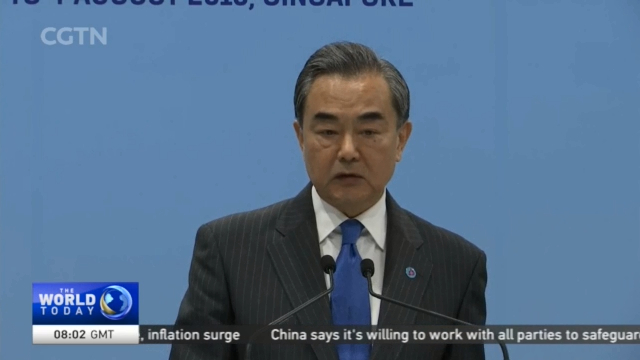
16:45, 04-Aug-2018
ASEAN Foreign Ministers' Meeting: China: Korean Peninsula, South China Sea issues are two major developments
Updated
16:14, 07-Aug-2018
03:01

We begin in Singapore, where Chinese Foreign Minister Wang Yi has held a press conference, as the ASEAN gathering wraps up. Wang pointed out both positive and negative factors happening in the region. Our correspondent Miro Lu has more.
He talked about three key points of the ASEAN Plus Three meeting.
WANG YI CHINESE FOREIGN MINISTER "Three points of common understanding were reached at the Foreign Minister's meeting. First one, all the participants agreed that they will work together to uphold free trade, oppose protectionism and insist upon multilateralism. Second, there should be fast progress in advancing East Asian Economic Community building. Third, in the face of current international political and economic environment, there should be an accelerated development in RCEP negotiation by the end of this year."
He later also talked about the East Asia Summit which is also known as "Ten Plus Eight", which is South Asian ten countries plus its eight dialogue partners. He said just came out of the meeting, they discussed the positive factors that's happening in the region and the negative.
In terms of positive, there are two developments. One is the Korean Peninsula development.
WANG YI CHINESE FOREIGN MINISTER "There needs to be parallel progress on both tracks in achieving denuclearization on the Korean Peninsula and establishing a peace mechanism there. This has been the long-standing proposition from the Chinese side and also the direction that China has been committed to."
The second positive factor that's happening in the region is what he said the South China Sea single draft negotiating text.
WANG YI CHINESE FOREIGN MINISTER "Thanks to the joint efforts from China and all the ASEAN countries, there has been continued progress in ensuring full and effective implementation of the DOC. We all believe that COC consultation will be able to enter into a fast track."
But then he also mentioned that there're some negative factors. There're some "dark clouds" over the Southeast Nations ahead. The first is of course the rise of unilateralism and protectionism, hence the US-China trading war, which is a big concern for Southeastern Asian nations. The second negative factor is he said that the non-regional countries, i.e., US has been sending a lot of military presence in the region. And he thinks that these are two concerns.
MIRO LU SINGAPORE "He thinks that it's time for non-regional countries to stop pointing fingers at the regional issues. And he thinks that the regional countries ASEAN are neighbours that have to wisdom to solve their own problems."

SITEMAP
Copyright © 2018 CGTN. Beijing ICP prepared NO.16065310-3
Copyright © 2018 CGTN. Beijing ICP prepared NO.16065310-3